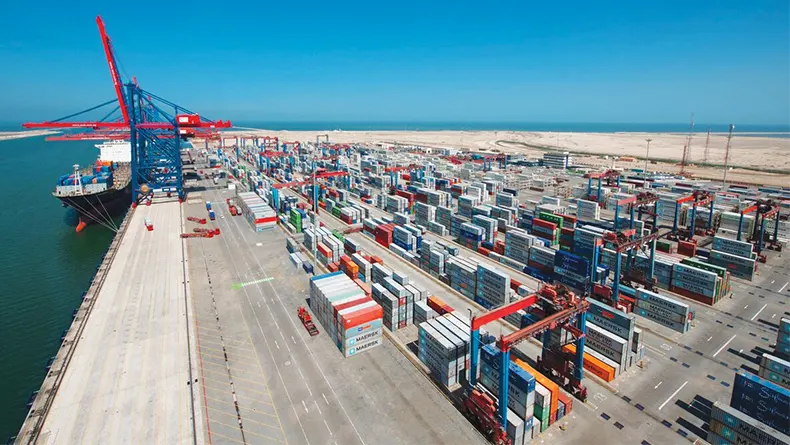Connecting Uganda across Africa and beyond
We have been connecting Ugandan businesses across Africa and beyond for many years.
Limark has been a trusted partner for Ugandan businesses, facilitating growth through efficient and reliable logistics solutions. Whether your cargo is coffee, tea, fish, flowers, or manufactured goods, we provide end-to-end solutions to ensure your shipments reach their destinations seamlessly.
Our extensive network, covering key transport corridors such as the Northern Corridor and strategic inland hubs, combined with our expertise in navigating Uganda’s trade landscape, opens doors to regional and global markets, enabling your business to thrive in the heart of East Africa.

Import regulations
Importing goods to Uganda requires navigating specific procedures and documentation. Here’s a breakdown of the essential requirements:
Product Categories Requiring Import Licenses/Permits
Food and Agricultural Products
Imports of meat, dairy products, fish, poultry, grains, fruits, and vegetables require import permits from the Ministry of Agriculture, Animal Industry, and Fisheries (MAAIF).
Phytosanitary certificates are necessary for plants and plant products to ensure they are free from pests and diseases.
Import licenses from the Uganda National Bureau of Standards (UNBS) are required for specific food products, such as sugar, wheat, and rice.
Pharmaceuticals and Medical Devices
- The National Drug Authority (NDA) regulates the import of pharmaceuticals and medical devices.
- Import permits and product registration are mandatory.
- Medicines must comply with Good Manufacturing Practices (GMP).
- Medical devices must meet relevant technical standards and be registered with the NDA.
Chemicals and Hazardous Materials
- The National Environment Management Authority (NEMA) regulates the import of chemicals and hazardous materials.
- Import permits are required, and detailed safety data sheets (SDS) must be submitted.
- Strict adherence to packaging, labeling, and transportation regulations is essential.
Used Vehicles and Spare Parts
- The Uganda Revenue Authority (URA) regulates the import of used vehicles and spare parts.
- Import permits are required for used vehicles.
- Age and environmental emission standards apply to used vehicles.
Other Regulated Products
Additional import licenses or permits may be required for specific products like:
- Telecommunication equipment
- Explosives
- Firearms and ammunition
- Wildlife and wildlife products
- Used clothing and footwear
- Chemicals and pesticides
- Prohibited and restricted imports:
Prohibited
- Narcotic drugs and psychotropic substances
- Pornographic and obscene materials
- Counterfeit and pirated goods
- Hazardous waste (Basel Convention)
- Ozone-depleting substances (Montreal Protocol)
- Polychlorinated biphenyls (PCBs)
- Mercury and mercury compounds
Restricted (require special permits)
- Live animals and animal products (require health certificates)
- Plants and plant products (require phytosanitary certificates)
- Firearms and ammunition
- Explosives
- Radioactive materials
- Endangered species and products (CITES permits required)
Relevant agencies
- Uganda Revenue Authority (URA) – Customs Department
- Ministry of Trade, Industry, and Cooperatives (MTIC)
- Ministry of Agriculture, Animal Industry, and Fisheries (MAAIF)
- National Drug Authority (NDA)
- National Environment Management Authority (NEMA)
- Uganda National Bureau of Standards (UNBS)
- Uganda Wildlife Authority (UWA)
Free Time
- Typically, 14 days for both general and containerized cargo after discharge.
- Free time can be extended by negotiation with the shipping line or port authorities.
Demurrage charges
- Applied when the free time is exceeded.
- Calculated per container, per day.
- Rates vary depending on the shipping line, container size, and time elapsed.
Detention charges
- Applied when the container is held beyond the agreed-upon time for return to the shipping line after being picked up from the port.
- Separate from demurrage charges.
- Rates vary depending on the shipping line and container size.
Storage Limitations
- Port terminals have limited storage capacity.
- Containers not cleared within the allowed time are moved to an off-dock depot at the importer’s expense.
Calculation Methods
Demurrage and detention charges are calculated based on calendar days, including weekends and public holidays.
Commercial Invoice
- Detailed description of goods (including HS codes)
- Quantity, weight, and unit price of goods
- Total invoice value (in USD or UGX)
- Incoterms (International Commercial Terms)
- Payment terms
- Consignee and consignor details
Packing List
- Detailed list of all items in each package
- Description, quantity, weight, and dimensions of each item
- Package markings and numbers
Bill of Lading/Airway Bill
- Evidence of the contract of carriage between the shipper and carrier
- Details of the shipment, including the consignee, consignor, and port of loading/discharge
Certificate of Origin
- Declares the origin of the goods
- May be required for preferential tariff treatment under trade agreements (e.g., EAC, COMESA)
Import Declaration Form (IDF)
- Submitted through the Uganda Electronic Single Window (UESW) system
- Requires detailed information about the shipment and importer
- Import Permit/License (for regulated goods):
- Issued by the relevant government agency
Other Certificates
- Phytosanitary certificate (for plants and plant products)
- Health certificate (for animals and animal products)
- Certificate of analysis (for chemicals and food products)
- CITES permit (for endangered species)
Import licenses and permits
- Identify the Regulating Agency:
- Determine the specific ministry or agency responsible for your goods based on the product category.
- Gather Required Documents:
- Proforma invoice or commercial contract
- Technical specifications and data sheets (if applicable)
- Certificates of origin, analysis, quality, etc.
- Business registration documents (for companies)
- Taxpayer identification number (TIN)
- Submit Application:
- Complete the import permit application form.
- Submit the application along with required documents and fees to the relevant agency.
- Applications are typically submitted online or in person.
- Processing and Approval:
- The application will be reviewed and processed by the agency.
- Processing times vary but can take several days or weeks.
- If approved, the import permit will be issued.
- Validity and Renewal:
- Validity periods vary depending on the product and agency.
- Renewal procedures involve submitting a new application with updated documents before the expiry date.
- Costs:
- Import permit fees vary depending on the product and agency.
- Additional costs may include inspection fees and testing fees.
Customs clearance procedures
- Pre-arrival Processing:
- Importer or their agent lodges the import declaration (IDF) through the UESW system.
- Customs performs risk assessment.
- Arrival and Unloading:
- Vessel or aircraft arrives at the port or airport.
- Cargo is unloaded and placed in customs control.
- Document Verification and Duty Assessment:
- Customs verifies the submitted documents.
- Import duties, taxes, and fees are calculated based on the HS code, value, and origin of the goods.
- Payment of Duties and Taxes:
- The importer or their agent pays the assessed amount.
- Inspection (if required): Customs may select shipments for physical inspection based on risk assessment.
- Release of Goods: If the shipment complies with all regulations and requirements, and duties/taxes are paid, customs releases the goods.
Port/Terminal operations
Major Seaports
- Mombasa Port (Kenya): The primary port for Uganda’s imports, providing efficient container handling and storage facilities. It is well-connected to major shipping routes and offers various logistics services.
- Dar es Salaam Port (Tanzania): An alternative port for Uganda’s imports, with similar services to Mombasa.
Air Cargo Hub
Entebbe International Airport: The main airport for air cargo imports, with dedicated cargo terminals and handling facilities.
Cut-off Dates
- Vary depending on the shipping line and destination.
- Confirm with your shipping agent or freight forwarder well in advance.
Documentation Requirements at Terminals
- Ensure all required documents are submitted electronically through the UESW system before the shipment arrives.
- Original documents may be required for verification at the terminal.
Container Pickup/Drop-off and Storage
- Coordinate with your shipping agent or freight forwarder for container pickup and drop-off procedures at the port of entry.
- Be aware of free time limitations and potential demurrage/detention charges.
Disclaimer: This information is based on the latest available data and may be subject to change. Always consult with relevant authorities and experts for the most up-to-date and accurate information.
Export regulations
Get a detailed guide that provides an in-depth look into every aspect of the export process to ensure your goods are shipped efficiently and in compliance with all legal standards.
Product Categories Requiring Export Licenses/Permits
Agricultural Products
Coffee: Uganda’s main export, coffee, requires export permits from the Uganda Coffee Development Authority (UCDA). Exporters must adhere to quality standards and obtain a Certificate of Origin from the Uganda National Chamber of Commerce and Industry (UNCCI).
Fish and Fish Products: The export of fish and fish products, particularly Nile perch, requires permits from the Directorate of Fisheries Resources (DFR) under the Ministry of Agriculture, Animal Industry, and Fisheries (MAAIF). Exporters must comply with catch limits and ensure the sustainability of fish stocks.
Flowers and Horticultural Products: Exporting flowers and horticultural products requires phytosanitary certificates from the MAAIF to ensure they are free from pests and diseases.
Other Agricultural Products: Other agricultural products, such as tea, tobacco, cotton, and cereals, may also require export permits or certificates from the MAAIF or relevant sector-specific agencies.
Minerals
The export of minerals, such as gold, tin, and tungsten, is regulated by the Ministry of Energy and Mineral Development (MEMD). Export permits are required to ensure responsible mining practices and compliance with environmental regulations.
Wildlife and Wildlife Products
The Uganda Wildlife Authority (UWA) strictly regulates the export of wildlife and wildlife products, including live animals, trophies, and animal parts.
CITES permits are required for endangered species listed under the Convention on International Trade in Endangered Species of Wild Fauna and Flora.
Other Regulated Products
Other products that may require export licenses or permits include pharmaceuticals, medical devices, chemicals, and cultural artifacts.
Prohibited and Restricted Exports
Prohibited
- Narcotic drugs and psychotropic substances
- Pornographic and obscene materials
- Counterfeit and pirated goods
- Hazardous waste (Basel Convention)
- Ozone-depleting substances (Montreal Protocol)
- Live or dead birds (except with special permits)
- Protected wildlife and endangered species (unless authorized by CITES)
- Restricted (require special permits):
- Live animals and animal products
- Plants and plant products
- Minerals and precious stones
- Firearms and ammunition
- Cultural artifacts and antiquities
Relevant agencies
- Uganda Revenue Authority (URA) – Customs Department: Responsible for customs administration and enforcement of export regulations.
- Ministry of Finance, Planning, and Economic Development (MoFPED): Oversees fiscal policies related to exports.
- Uganda Coffee Development Authority (UCDA): Regulates coffee exports.
- Ministry of Agriculture, Animal Industry, and Fisheries (MAAIF): Regulates the export of agricultural products and live animals.
- Ministry of Energy and Mineral Development (MEMD): Regulates the export of minerals.
- Uganda Wildlife Authority (UWA): Regulates the export of wildlife and wildlife products.
- Uganda National Bureau of Standards (UNBS): Responsible for quality standards and certification for certain exports.
Required Documents
- Commercial Invoice: Detailed description of goods (including HS codes), quantity, weight, value (in USD or UGX), Incoterms, payment terms, and consignee/consignor details.
- Packing List: Itemized list of goods in each package, including description, quantity, weight, dimensions, and package markings.
- Bill of Lading/Airway Bill: Evidence of the contract of carriage between the shipper and carrier, with details of the shipment, consignee, consignor, and port of loading/discharge.
- Certificate of Origin: Issued by the UNCCI, declaring the origin of the goods. It may be required for preferential tariff treatment under trade agreements (e.g., EAC, COMESA).
- Export Declaration Form (EDF): Submitted through the Uganda Electronic Single Window (UESW) system. Requires detailed information about the shipment and exporter.
- Export Permit/License (if applicable): Issued by the relevant government agency.
Export Declaration Process (through UESW)
- Register as an exporter on the UESW platform.
- Prepare and submit the EDF electronically through UESW.
- Customs verifies the declaration and supporting documents.
- If compliant, customs approves the export and issues an export permit (if required).
Required Export Certificates
- Phytosanitary Certificate (for plants and plant products): Issued by the MAAIF.
- Health Certificate (for live animals and animal products): Issued by the MAAIF.
- Certificate of Analysis: May be required for specific products like coffee and tea to confirm quality and safety standards.
- CITES Permit (for endangered species): Issued by the UWA.
Major Ports
- Port of Mombasa (Kenya): The primary port for Uganda’s exports, providing efficient container handling and storage facilities. It is well-connected to major shipping routes and offers various logistics services.
- Port of Dar es Salaam (Tanzania): An alternative port for Uganda’s exports, with similar services to Mombasa.
Cut-off Times and Procedures
- Vary depending on the shipping line and destination.
- Confirm with your shipping agent or freight forwarder well in advance.
- Procedures typically include document submission through UESW, customs clearance, security screening, and container loading.
Container Storage and Free Time
- Limited container storage is available at the transit ports.
- Free time for storage varies depending on the port and shipping line.
- Storage fees apply after the free time expires.
Returning empty containers
- Coordinate with your shipping line or agent to return empty containers to the designated depot.
- Failure to return containers on time may result in detention charges.
Duties, taxes, and fees
Export Duties: Generally, Uganda does not impose export duties on most goods.
Other Fees: Customs processing fees, document handling charges, terminal handling charges, storage fees (if applicable), and any specific taxes or levies related to the exported product.
Disclaimer: This information is based on the latest available data and may be subject to change. Always consult with relevant authorities and experts for the most up-to-date and accurate information.

Expertise You Can Trust
Seamless cross-border shipping to and from Uganda
Count on Limark to simplify Uganda’s trade regulations. Our team’s extensive knowledge of local laws and customs procedures ensures smooth and efficient shipments, preventing costly delays and disruptions. With our growing presence in Uganda, we’re dedicated to providing reliable and cost-effective shipping solutions.
Rely on our experienced local supply chain experts, combined with our robust infrastructure and cutting-edge technology, for seamless operations and significant cost savings. Contact our team to request a quote, book, or learn more about our end-to-end solutions.
Get Expert Guidance
Contact our regional experts
Partner with experienced freight forwarders and customs brokers for seamless shipping to and from Uganda. Ensure full documentation compliance with the guidance and logistics services of our team.
Sales enquiries
We’re happy to talk to you about your shipment needs anytime. Please get in touch with us.
Ready to ship?
Get your shipment moving faster. Request a quote today for our end-to-end supply chain services.
Other African Countries





